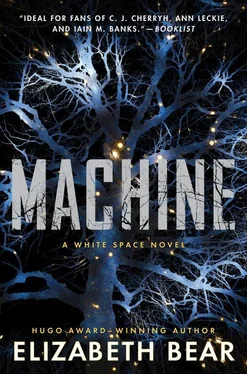The relief vessels arrived while we were still filling Afar’s hold with foam. We gave them all the data we’d collected on Afar, on the generation ship, and on the precarious balance of the lives inside her. The newcomers included Sally’s sister ship, Ruth (Synarche Medical Vessel I Salve Harsh Wounds With Mercy , which I felt was one of the more awkward efforts of the poetical ship-naming corps). The ships and their crews got busy exploring and mapping the rest of Big Rock Candy Mountain , and—to Helen’s relief and agitation—setting up a kind of bucket brigade to get another load of cryo chambers shifted.
As for us, as soon as we finished muffling the craboid in packing peanuts, we turned back toward Core General.
We punched it, flying home as fast as a data packet and an ambulance ship could go. Which was fast: the only speedier ships in the Synarche were Judiciary Interceptor-class vessels.
Despite our rate of travel, that return trip would take a while. Not because we’d come very far, in terms of stitching through white space. I mean, sure, we were somewhere way out in the Sagittarius Arm, rather farther than we usually ventured from the hospital, but that wasn’t the problem. The problem was that we were moving extremely fast in the real universe, having had to match v with Big Rock Candy Mountain to catch up with her in the first place.
Zooming along as we were, a good chunk of the non-white-space return journey would be spent in dumping v : slowing down so that we didn’t streak through the Core in a relativistic blur before passing out the other side, still smoking. I mean, inasmuch as anything can streak through a structure tens of light-ans across.
Nobody really likes it when you tear through their pleasant residential neighborhood at a rate of several astronomical units per hour.
We’d have to dump v around gravity wells again, the same way we’d gained it outbound. Also, we could make up for a lot of it by coming up on the Core from the right direction. If we looped around and chased the Core’s direction of travel through the larger universe, it would be easier to match relative velocities.
We were actually—in real terms—quite close to Terra right now. I felt a pang of melancholy at how long it had taken Big Rock Candy Mountain to travel such a little distance. That poignancy was replaced with unease when I remembered that even that little distance was two or three times as far as it should have come.
There were entirely too many mysteries surrounding this little rescue mission.
Nevertheless, I regretted the missed opportunity to visit the human homeworld while we were in the neighborhood. I had never been there.
Spacers don’t feel a lot of nostalgia for places , usually. But I wasn’t born in space.
It wasn’t going to happen: we needed to get home—to our real home, not my ancestral one. And work didn’t offer a lot of time to mourn, because Helen was having a hard enough time leaving her ship behind that I wished there were a way to sedate androids. Peripherals. Whatever.
There wasn’t, though, short of a computer virus.
One thing about space travel: even when you’re in a hurry, it takes a long time to get where you’re going, because everything is extremely far away. And ships are mostly self-maintaining, though the shipminds do get bored if you don’t give them people to talk to. Or at least they say they do. We’re unpredictable compared to AIs, or so I’m told, and therefore amusing. We make great pets.
I understood. I missed having cats on Sally. Most human ships have some kind of pet—cats, or domesticated rats, or something similar: small and adaptable. But, for all the obvious reasons, pets were a liability on an ambulance.
Still, organic and inorganic sentiences both required some environmental enrichment to make space travel tolerable.
Hobbies, I mean. I’m talking about hobbies.
I imagine that a lot of novels get written by long-haul pilots. And games programmed. And songs and scripts developed. I knew a guy back in the Judiciary who knitted and did cross-stitch, but mostly people stick to more digital forms, or ones requiring only a limited number of supplies rather than an elaborate stash on a limited consumable budget. Trust my insider knowledge when I tell you that the only thing more frustrating than running out of variegated peach embroidery floss halfway to Aldebaran is being the shipmate of somebody who has run out of variegated peach embroidery floss halfway to Aldebaran.
I’m not as creative as some of my shipmates have been. I don’t make anything. I have a ukulele, which is a nicely compact instrument that doesn’t require too much sound baffling to be played inside a hull. And mine is not some priceless antique made of real Terran wood or anything. It’s a soundbox and neck printed out of nice, dense polymer, with old-fashioned strings that make noise by vibrating and causing echoes, and pegs to tune it. It has a bridge and a nut and no audio pickups at all. If we had to take it apart for consumables, Sally could print me another one as soon as we got back to port and filled our hoppers again.
That’s never happened yet, though. Space is scary. But not scary enough to eat my uke.
Not yet, anyway.
More importantly, I’m an okay-enough player that my shipmates don’t mind. Especially since I make sure I don’t practice all the time.
That’s what VR games are for.
The sandbox-style ones are best for long trips, because you don’t run out of things to do. There are always more flowers to pick or butterflies to milk or coins to grind. My current favorite is probably kind of too much like my daily life to really count as recreation: it’s Orphan Queen , where you explore an abandoned space ship and find Mysterious Things. Well, that’s my favorite unless my favorite is the historical Fascism and Facsimile . But Melusine is great, too, especially the content tranche where you’re climbing around inside the giant clock in the palace walls. I have to play them all in single-player mode, unless Tsosie is in the mood, because you can’t exactly get a real-time network across hundreds of light-ans. I do some play by packet, too, which gets me some interaction outside of the ship’s community, even if it’s asynchronous.
I like my coworkers. But if you’ve never been trapped in three hundred and fifty cubic meters with five other sentients, I invite you to try it before you judge how far I’m willing to go to talk to somebody else once in a while. Loese and Tsosie have families; Hhayazh and Rhym have in-species social associations. I keep in touch with my daughter, Rache, but she’s at that age where she wants to prove her independence and autonomy, so I don’t find out much about what’s going on. And I get the sense that Rache feels I’m kind of an absentee parent, which… okay, fair.
Her other mom and I don’t talk much anymore.
The packet games are slow. I’ve been playing one particular one since I was in the Judiciary: it’s gotten through almost a whole week of game time now.
It’s nice to have the continuity through my life, however.
This trip, I didn’t get as much roleplaying done as I might otherwise. We were bending light with our speed, Sally putting her overclocked white coils to the test, the warp-striated bands of starshine from the galaxy outside our bubble scrolling past in a steady flicker. We must have passed pretty close to a star at one point, because it got so bright outside I thought we had somehow reached the Core much in advance of our ETA. Afar’s shielding held up, though, and his crew kept right on breathing.
The speed wasn’t why I was busy: Sally and Loese handled that comfortably on their own. Helen was the ongoing distraction. Helen, who had been left alone for a very long time indeed. Helen, who wasn’t emotionally stable.
Читать дальше












